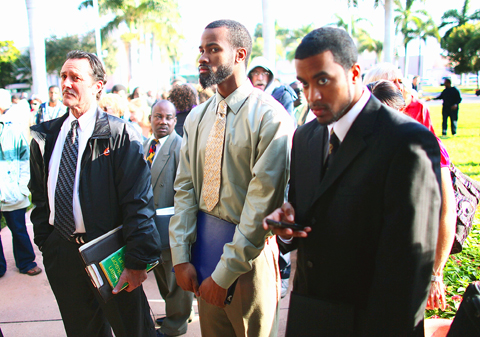The White House said yesterday a US$787 billion economic stimulus plan had saved or created up to 2 million jobs, but that its impact on quarterly economic growth had slowed.
US President Barack Obama’s Council of Economic Advisors (CEA) said the bill, known as the Recovery Act, had added between 3 and 4 percentage points to GDP growth in the third quarter of last year. But it said that the plan, which was fiercely opposed by Republicans when it was passed last year, had a slightly smaller impact on economic expansion in the fourth quarter, adding between 1.5 and 3percent to economic growth.
In effect, the White House argued that without the stimulus, the economy may not have returned to growth at all after a brutal recession.

PHOTO: AFP/GETTY IMAGES
“We know that when you have fiscal stimulus it has the biggest impact of growth rates when it is first ramping up,” CEA chair Christina Romer said.
The administration is battling to restore robust economic growth as it enters a crucial political year, with unemployment at 10 percent ahead of mid-term congressional elections in November.
The CEA report said that the stimulus had raised employment by up to 2 million jobs as far as the end of last year.
“Our estimate is that as of the fourth quarter 2009, we think the Recovery Act has added between 1.5 to 2 million jobs relative to where we otherwise would have been,” Romer told reporters.
She described the Recovery Act as “the biggest, boldest stimulus in American history.
“It has done exactly what we anticipated it would do,” Romer said.
Republicans have however lashed the economic stimulus act as a costly failure and are branding Obama a “job-killing president.”
Representative Darrell Issa, the top Republican on the House Oversight and Government Reform Committee, blasted what he called the “self-serving and deceptive numbers being put out by the White House” on job creation.
“Another word for it is propaganda,” Issa said in a statement.

MORE VISITORS: The Tourism Administration said that it is seeing positive prospects in its efforts to expand the tourism market in North America and Europe Taiwan has been ranked as the cheapest place in the world to travel to this year, based on a list recommended by NerdWallet. The San Francisco-based personal finance company said that Taiwan topped the list of 16 nations it chose for budget travelers because US tourists do not need visas and travelers can easily have a good meal for less than US$10. A bus ride in Taipei costs just under US$0.50, while subway rides start at US$0.60, the firm said, adding that public transportation in Taiwan is easy to navigate. The firm also called Taiwan a “food lover’s paradise,” citing inexpensive breakfast stalls

TRADE: A mandatory declaration of origin for manufactured goods bound for the US is to take effect on May 7 to block China from exploiting Taiwan’s trade channels All products manufactured in Taiwan and exported to the US must include a signed declaration of origin starting on May 7, the Bureau of Foreign Trade announced yesterday. US President Donald Trump on April 2 imposed a 32 percent tariff on imports from Taiwan, but one week later announced a 90-day pause on its implementation. However, a universal 10 percent tariff was immediately applied to most imports from around the world. On April 12, the Trump administration further exempted computers, smartphones and semiconductors from the new tariffs. In response, President William Lai’s (賴清德) administration has introduced a series of countermeasures to support affected

CROSS-STRAIT: The vast majority of Taiwanese support maintaining the ‘status quo,’ while concern is rising about Beijing’s influence operations More than eight out of 10 Taiwanese reject Beijing’s “one country, two systems” framework for cross-strait relations, according to a survey released by the Mainland Affairs Council (MAC) on Thursday. The MAC’s latest quarterly survey found that 84.4 percent of respondents opposed Beijing’s “one country, two systems” formula for handling cross-strait relations — a figure consistent with past polling. Over the past three years, opposition to the framework has remained high, ranging from a low of 83.6 percent in April 2023 to a peak of 89.6 percent in April last year. In the most recent poll, 82.5 percent also rejected China’s

PLUGGING HOLES: The amendments would bring the legislation in line with systems found in other countries such as Japan and the US, Legislator Chen Kuan-ting said Democratic Progressive Party (DPP) Legislator Chen Kuan-ting (陳冠廷) has proposed amending national security legislation amid a spate of espionage cases. Potential gaps in security vetting procedures for personnel with access to sensitive information prompted him to propose the amendments, which would introduce changes to Article 14 of the Classified National Security Information Protection Act (國家機密保護法), Chen said yesterday. The proposal, which aims to enhance interagency vetting procedures and reduce the risk of classified information leaks, would establish a comprehensive security clearance system in Taiwan, he said. The amendment would require character and loyalty checks for civil servants and intelligence personnel prior to